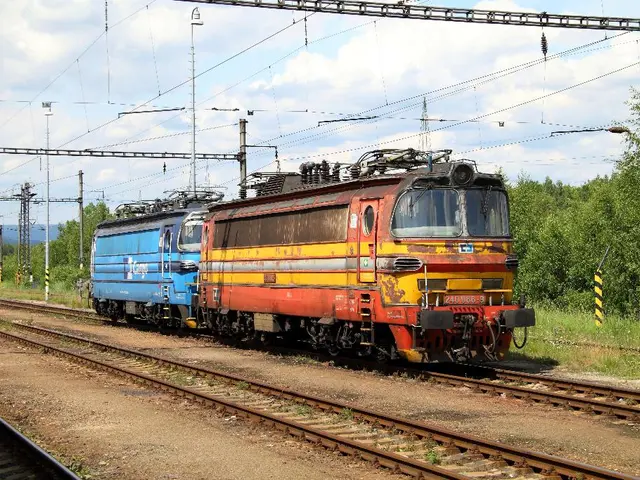Facilitating Global Unity: Kazakhstan's Crucial Contribution to International Collaboration
Kazakhstan: Bridging East and West in a Changing World
In today's tumultuous global landscape, characterized by geopolitical tensions, climate change, and economic instability, international cooperation has never been more crucial. Step up to the plate, middle powers like Kazakhstan, who are prepared to take on roles once reserved for the world's superpowers. In the challenging times ahead, Kazakhstan will play a unique role, bridging the East and the West, serving as a conduit for dialogue and exchanges worldwide.
So, what's the plan for Kazakhstan in the coming years? The Astana International Forum 2025, slated to take place in the Kazakh capital from May 29 to 30, will cover foreign policy, energy, and finance, with around 5,000 delegates from over 50 countries expected to attend. With the theme "Connecting Minds, Shaping the Future," the event seeks to inspire cross-border dialogue, ultimately leading to collaborative solutions for pressing global issues.
The Middle Power Rises
Kazakhstan's strategic positioning within Eurasia, bordered by Russia, China, the Kyrgyz Republic, Uzbekistan, Turkmenistan, and the Caspian Sea, places it at the epicenter of major geopolitical interests and transcontinental trade dynamics. The nation's foreign policy prioritizes cooperation with its international partners, and its multi-vector approach has augmented its contributions to the promotion of global trade, strengthening economic relations, and fostering sustainable growth, both domestically and regionally.
The country's participation in major trade corridors, such as the Belt and Road Initiative (BRI) and the Trans-Caspian International Transport Route (TITR), showcases its role in fostering trade and diplomatic relationships between East and West. In 2024, the volume of goods transported via the Middle Corridor surged by 62%, reaching 4.5 million tons, and is projected to reach an annual capacity of 10 million tons by 2027. Over 80% of goods from China and Central Asia destined for land-based transportation to Europe travel via Kazakhstan, illustrating its importance as a key transit hub in Eurasian trade.
Kazakhstan aims to further its regional and global impact by continuing to create bridges between continents, cultures, and nations. Additionally, the nation has focused on solidifying its international reach through multinational initiatives such as the Central Asia Plus Framework, aimed at enhancing regional cooperation. As cooperation and collaboration become increasingly important, Kazakhstan's active role in such initiatives is resonant.
The Advocate and Diplomat
As an advocate for the Great Gain for All principle, Kazakhstan promotes cooperation over competition in global relations. In line with the United Nations' commitment to global security and stability, Kazakhstan has been actively supporting UN peacekeeping efforts, deploying peacekeepers to various missions around the world. Since gaining independence, Kazakhstan has earmarked $600 million for humanitarian and development assistance. The nation also offers a neutral platform for facilitating peaceful resolutions to regional conflicts, such as the Astana Process on Syria and the recent talks between Azerbaijan and Armenia.
The Changemaker
In addition to its diplomatic endeavors, Kazakhstan plays a pivotal role in supporting global energy markets. It supplies 43% of the world's uranium needed for nuclear power plants and produces more than half of the EU's critical raw materials. Kazakhstan is also investing in green hydrogen production, wind energy, and solar power, aiming to become a leader in renewable energy exports. Through its strategic initiatives and diplomatic engagements, Kazakhstan is shaping global governance to reflect the need for peace, stability, and cooperation in the multipolar reality of the 21st century.
Stay tuned for the Astana International Forum 2025, as Kazakhstan continues to shape the world's future for the better.
Photo credit: our website
References:[1] Astana International Forum website (2021). Event details and themes. Retrieved from https://aif.kz/en/[2] Roman Vassilenko, Deputy Foreign Minister of Kazakhstan interview, Astana Times (2021). Kazakhstan's role in global trade and economics. Retrieved from https://astanatimes.com/2021/11/kazakhstans-role-in-global-trade-and-economics/[3] Investment in the Middle Corridor, Kazakh Invest (2021). Retrieved from https://invest.gov.kz/en/areas-of-attraction/transport-and-logistics/middle-corridor/[4] Regional Conflict Resolution, Office of the UN Secretary-General (2020). Retrieved from https://www.un.org/sg/en/content/sg/coin/region/central-asia/[5] Sustainable Development Goals (SDGs), United Nations Development Programme (2021). Retrieved from https://www.undp.org/content/undp/en/home/sustainable-development-goals.html
- Recognizing the importance of international cooperation in a world fraught with geopolitical tensions, climate change, and economic instability, Kazakhstan, as a middle power, aims to prioritize connecting with key partners in 2025 via the Astana International Forum, with a focus on foreign policy, energy, and finance.
- In the pursuit of maintaining regional and global influence, Kazakhstan, with its strategic positioning in Eurasia, plans to further solidify its role in the connecting of minds and shaping the future by continuing to foster trade and diplomatic relationships between East and West, while also investing in renewable-energy industry.
- As a diplomat and advocate for global peace, stability, and cooperation, Kazakhstan will continue to promote the Great Gain for All principle, actively supporting United Nations peacekeeping efforts and offering a neutral platform for resolving regional conflicts.
- In addition to diplomatic activities, Kazakhstan, a key player in global energy markets, aims to become a leader in green hydrogen production, wind energy, and solar power exports, thereby shaping 21st-century global governance to reflect the need for sustainable growth and renewable-energy industry.








